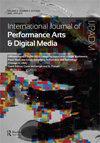城市酒神:叙述城市生活中的荒原
IF 0.9
0 THEATER
International Journal of Performance Arts and Digital Media
Pub Date : 2023-01-02
DOI:10.1080/14794713.2023.2177431
引用次数: 0
摘要
摘要本文件以TS·艾略特的《荒原》百周年纪念为契机,重新考虑了在处理占据批判性和创造性思维的主题时的反射性和话语性,讨论了新冠肺炎大流行期间和之后,一位社会科学家和一位剧作家之间的合作。它的主要作品是一部名为《荒原》的戏剧,它有一个以封锁的问题事件为框架的下层故事,因为它不仅面临荒原的负面影响,还面临着同时否定荒原的可能性。该剧将自己安置在享有特权的伦敦大学学院学生中心,通过反复重演来探究其“传奇事件”。作为一场跨越以“成为事件”为标志的时间门槛的文字和世界之间的相遇,该剧将建筑吸引到焦点,使其衍射、模糊,最终将其开辟为一片荒地。它基于古希腊城市酒神的戏剧传统,依靠“预备曲”,多个“草稿”阅读,强调的不是舞台表演,而是从容、未完成、即兴和临时的身份文本。因为,在本文中的主观间交流中,我们发现“持续感”(Berlant 2008)存在于我们(后)疫情的当下。本文章由计算机程序翻译,如有差异,请以英文原文为准。
City Dionysia: narrating wasteland in urban life
ABSTRACT Using the centennial anniversary of TS Eliot’s The Waste Land as an opportune moment to reconsider the reflexive and the discursive in addressing themes occupying critical and creative thought, this document discusses the collaboration between a social scientist and a playwright during and in the aftermath of the COVID-19 pandemic. Its main output, a play titled Wasteland, had an understory framed by the problem-event of the lockdown as it confronted not only the negativity of wasteland but also the possibility of negating it simultaneously. The play situates itself in the privileged UCL Student Centre to probe its ‘storied matter’ through repeated re-enactments. As an encounter between words and worlds across a temporal threshold marked by ‘becoming-events’, the play draws the building into focus, diffracting it, blurring it, and finally opening it up as a wasteland. Based on the Ancient Greek theatrical tradition of City Dionysia, it relies on ‘preplays’, multiple ‘draft’ readings, to emphasise less a staged performance and more an identity text that is unhurried, unfinished, improvised and provisional. For, in the inter-subjective exchanges within this text we find ‘the sense of ongoingness’ (Berlant 2008) to inhabit the now of our (post)pandemic present.
求助全文
通过发布文献求助,成功后即可免费获取论文全文。
去求助
来源期刊

International Journal of Performance Arts and Digital Media
Arts and Humanities-Visual Arts and Performing Arts
CiteScore
1.70
自引率
0.00%
发文量
29
 求助内容:
求助内容: 应助结果提醒方式:
应助结果提醒方式:


